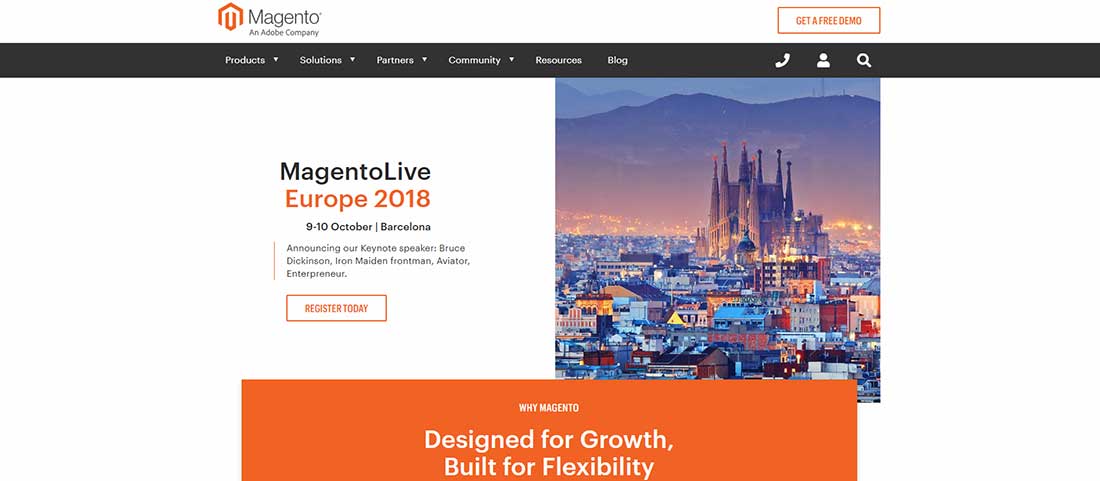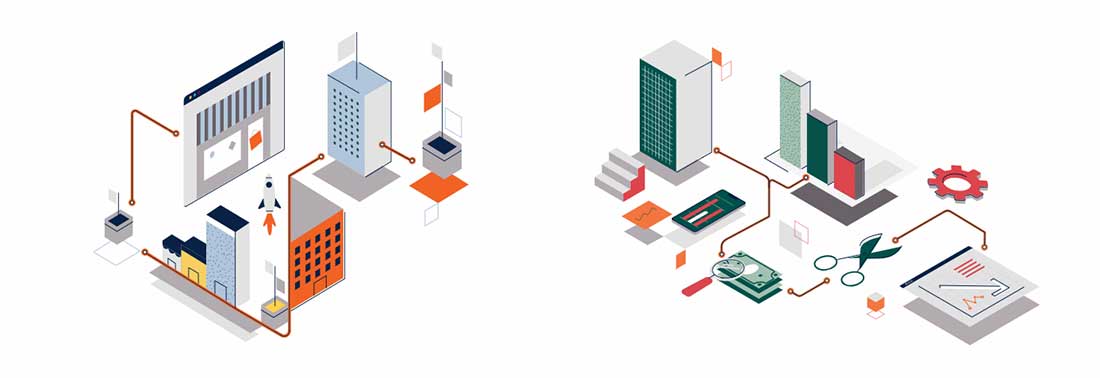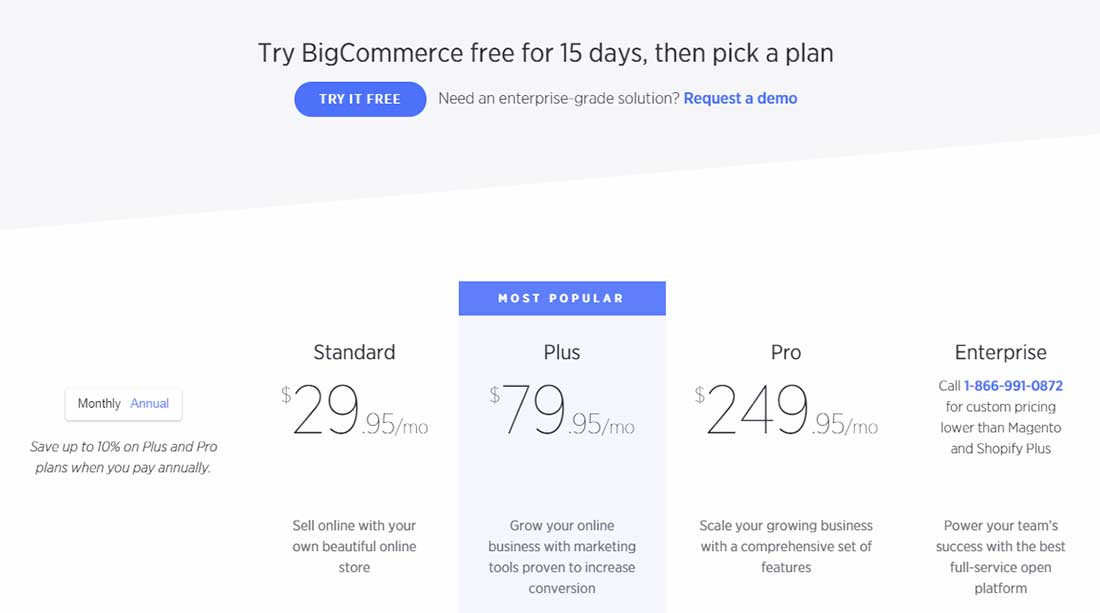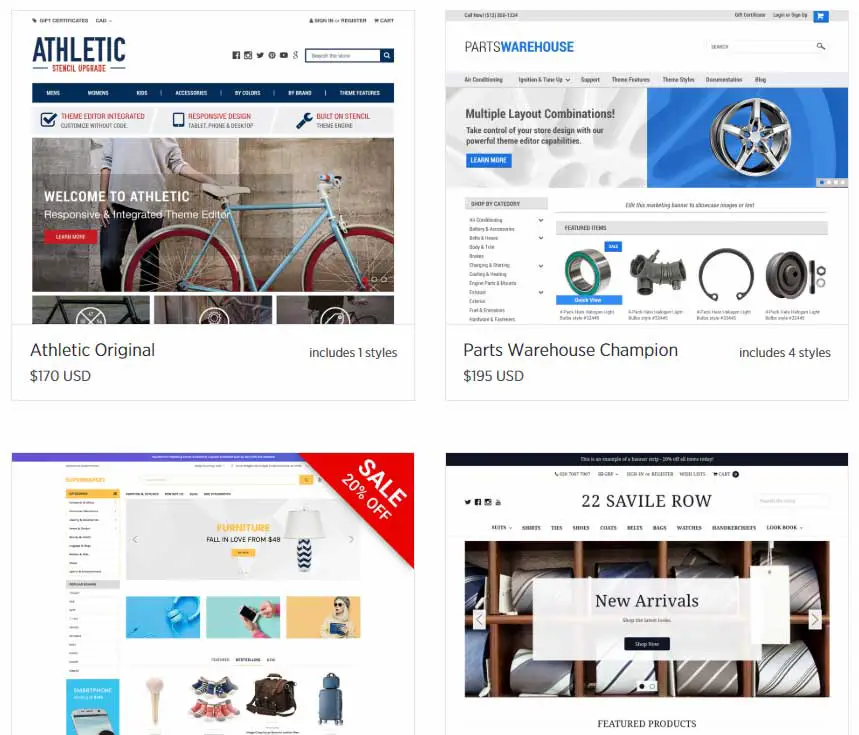Are you looking for an e-commerce solution that’s ideal for your online shop? Today, we decided to make it easier for you to decide and show you the pros and cons of two of the most popular e-commerce solutions: Bigcommerce vs. Magento.
In this detailed comparison, we will compare the out-of-the-box e-commerce platform – Bigcommerce – with the Magento content management system for self-hosted online stores. We’ll show you what are their best features, talk about their costs, analyze the customization and design options, and more. We’ll also add some links with some of our roundups with the best Bigcommerce themes, Magento themes, and other useful links any online shop owner should check out.
After reading this detailed comparison guide, you will be able to decide which one of these two is the best e-commerce solution for your business.
Bigcommerce vs Magento | General info
Bigcommerce is a SaaS (software as a service) solution for online stores, or generally speaking, it’s an e-commerce platform that gives you a full package with all the features and tools you need to launch an online shop in just a few hours. You can get access to this service by paying a monthly or yearly fee and all the management part is done from a single dashboard. Almost every feature of your store can be customized without the help of a web designer and you don’t even have to be familiar with the service, as the dashboard is extremely intuitive and easy to use even by beginner online shop owners who don’t have experince with managing an online store.
Magento is one of the best eCommerce platforms with flexible cloud solutions that help your business grow online. Magento is a CMS designed for growth and built for flexibility. It is a cloud commerce platform that comes as an open-source solution for launching an e-commerce website. It can be used by B2C, B2B, and mixed businesses and offers a lot more than just a simple online shop website, with extensions for email marketing, mobile, marketplaces, and more. No matter what your commerce objectives are, Magento has you covered with its rich features, the unlimited customization ability, and seamless third-party integrations.

Bigcommerce vs Magento |Pricing comparison
Bigcommerce pricing
Bigcommerce has 4 pricing plans. For each plan, you get no transaction fees and unlimited products, file storage, bandwidth, and staff accounts.
- Bigcommerce Standard: $29.95/mo
- Bigcommerce Plus: $79.95/mo
- Bigcommerce Pro: $249.95/mo
- Bigcommerce Enterprise: varies
What’s included in the Bigcommerce Standard plan:
- different sales channels (branded online store, eBay and Amazon, a point of sale, Facebook/Instagram, Pinterest, Google Shopping.
- responsive website template
- single-page checkout
- Apple Pay
- coupons
- discounts and gift cards
- shipping label discounts
- real-time shipping quotes
- professional reporting tools
- blog, product ratings and reviews
- free Sitewide HTTPs and Dedicated SSL
- shipperHQ shipping rules engine.
- This plan covers up to $50k online sales per year.
What’s included in the Bigcommerce Plus plan (all of the above from the previous plan, plus the following):
- customer groups and segmentation
- abandoned cart saver
- stored credit cards
- This plan covers up to %150k sales per year.
What’s included in the Bigcommerce Pro plan (all of the above from the previous plans, plus the following):
- Google customer reviews
- faceted search (product filtering)
- custom SSL
- This plan covers up to $400k sales per year.
What’s included in the Bigcommerce Enterprise plan (all of the above from the previous plans, plus the following):
- custom facets
- price lists
- unlimited API Calls.
You can test each plan before paying, as you get a 15 days trial period with no credit card required.
Other Bigcommerce fees that may apply
Bigcommerce has no transaction fees on all plans, unlike other similar e-commerce SaaS solution, though you’ll be charged credit card payment fees depending on the provider you choose.
Bigcommerce uses Braintree as a credit card processing provider, a company affiliated with PayPal. The US rates are:
- Braintree credit card processing fees for Bigcommerce Standard: 2.9% + 30c
- Braintree credit card processing fees for Bigcommerce Plus: 2.5% + 30c
- Braintree credit card processing fees for Bigcommerce Pro: 2.2% + 30c
- Braintree credit card processing fees for Bigcommerce Enterprise: 2.2% + 30c
Another good thing about this is that as you grow, your fees get smaller. For example, for the Bigcommerce Enterprise plan you can get as low as 2.2% + $0.30 per transaction.
Magento costs
The costs of using Magento for your site differ greatly depending on what Magento edition you choose to build your store with.
The Magento Community edition is the one that’s free to download. This version has no development support, so you will have to hire a web designer/web developer to help you out. It’s cheaper if you use a Magento template (we’ll talk about them in more detail below) rather than hiring an agency or a designer to build your site from scratch.
You will also need to purchase a domain, a hosting plan, an SSL certificate and as we mentioned before, a Magento theme. To give you some estimated costs, a domain may cost you somewhere around $15, web hosting is around $8 per month, but it increases as your traffic and resources needs grow, and an SSL certificate is around $70.
The Magento Enterprise Edition was specially created for very large online stores and it is not free. The starting price is at $1,988.00/month! It is a special solution for e-commerce stores and we will not detail it here, as we’ll insist on what Magento Community has to offer in comparison to Bigcommerce.
Magento has no transaction fees, however, just like for Bigcommerce, credit card processing fees will apply depending on the provider you choose.
Bigcommerce vs Magento | Online store management
We’ll tell you right from the start, for small-medium businesses, Bigcommerce is the best solution because it offers you all the tools you need for managing your store with ease and minimum costs.
For Magento, it will take you some time to learn how to use it, and once your site gets more complex, you may need to hire a specialist to manage it for you. It offers an agile and user-friendly solution for launching your site quickly and smoothly. You can adapt it to the market needs in real time, and achieve a return of investment faster than with other solutions.
Bigcommerce can be managed with ease via the intuitive dashboard. Even the website design can be customized by you without having any previous coding knowledge! You can manage everything from just one place, from sales and inventory to marketing campaigns and more! With Magento, you can do everything Bigcommerce lets you do and even more, as it is very flexible, however, you can’t do it by yourself if you are not familiar with it.
Bigcommerce also comes with a support team that will answer you all your questions, unlike Magento which is free and doesn’t offer this service.
Magento also has a well-designed user interface and for small-medium sites, it may be fairly easy to use, but for novice users, it may get complicated fast. You can manage all inventory and sales through a single product control and distribution system. You’re also in charge of everything, from hosting to design, backups and security checks.
Bigcommerce vs Magento | Payments system
Bigcommerce lets you choose from a wide variety of payment gateways and you can even accept checks, bank deposits, or cash on delivery.
Here are some of the most popular payment gateways you can choose from, for Bigcommerce: Amazon Pay, PayPal powered by Braintree, PayPal Credit via PayPal Express Checkout, Square, Stripe and Worldpay.
Magento Community is at a disadvantage in this case, as by default it doesn’t offer support for a lot of gateways. However, more gateways can be added to Magento store via third-party add-ons. You can integrate multiple shopping experiences like Amazon and eBay.
Bigcommerce vs Magento | Website Design
Bigcommerce gives you access to 7 free themes but the designs limited and very simple. If you look at them carefully, you’ll notice that there are in fact just 2 main themes with variations. There are a lot of paid themes you can choose from, with prices around $145 or $235 per template. The paid templates gallery includes about 50 distinct themes, or over 100 themes if you count them with their variations included.
Any Bigcommerce template you may choose can be easily customized via the intuitive editor, so no need for a web designer to do this part for you. Fonts, colors, page elements, anything can be modified with ease.
Magento offers robust customization capabilities. It comes with an advanced interface you can use to edit the raw HTML/CSS code directly, thus giving you complete control over the design of your store. However, in this case, you will have to hire a web developer to do it for you.
if you’re looking for some Magento resources, check out the articles below. In the e-commerce templates and themes roundups, you can discover some Magento website themes as well.
- How to Create a Custom Theme in Magento
- 15 Top Free eCommerce Themes for Your Store
- 20 Fashion Bootstrap Templates with Elegant Designs
- 20 Crafty E-commerce Website Templates for Your Handmade Business
- Top 20+ Fashion & Clothing Ecommerce Website Templates & Themes
- 20+ Accessories Website Templates And WordPress Themes
A Magento theme can be free or you can pay 50-150$ for a premium one. Most premium Magento themes cost somewhere around $55. Check out the roundup links above to see some of our top picks for Magento themes for selling both digital and physical products.
Bigcommerce vs Magento | Extensions (apps and add-ons)
Both Bigcommerce and Magento lets you add extensions to increase their capabilities. You can add apps and add-ons for marketing, accounting, sales, shipping, coupons, discounts, and other purposes. You will definitely find an extension for what you need.
Bigcommerce’s App Store contains 600+ add-ons, both free and paid, for almost any purpose you may think of:
- Shipping apps: ShipperHQ, Ordoro, Endicia, ShipStation and ShippingEasy.
- ERP integrations: NetSuite, Brightpearl and Microsoft Dynamics.
- Accounting apps: QuickBooks, Xero and Sage.
- CRM apps: Salesforce, NetSuite and Zoho.
- Marketing & conversion apps: HubSpot, Google AdWords, A/B testing tools, and more.
- Powerful API: For custom integration creations.
Magento, being one of the most popular e-commerce solutions on the web, gives you access to 5000+ apps and add-ons, both open-source and paid. You can find Magento add-ons for adding new payment gateways, generating leads, optimizing your site, SEO, and more.
Here are some e-commerce articles you may be interested in:
- 5 Reasons Your Small Business’s Website Needs to Pack More Punch (Even if You Don’t Sell Online)
- How To Pick A Niche For Your E-commerce Business
- The Most Important Features of an E-commerce Theme
- 7 Tips to Creating the Perfect E-Commerce Website
- Mistakes to Avoid When Designing an eCommerce Website
Bigcommerce vs Magento | Scalability
Both Bigcommerce and Magento offer good scalability options, each with its good and bad parts.
Bigcommerce offers an efficient process for scaling up your site, so you won’t worry about performance issues, downtime, or other problems that usually appear when your site grows. You just have to upgrade your plan and the resources are instantly offered to you.
With Magento, it gets complicated. It may be a cheaper solution at first, but once your site and traffic grow, you will have a lot more to worry about. Regular backups, updates, security checks, all these will require time and knowledge, or in case you can’t do it, money to hire a specialist or even a team. Your hosting costs will also increase.
Magento is a hands-on e-commerce solution, but for small and medium business this may not be the best choice.
To conclude this Bigcommerce vs. Magento detailed comparison guide, both of these e-commerce solutions come with their pros and cons in terms of costs, scalability, design customization and store management. Now that you know in general terms what they have to offer, you can decide what is the best e-commerce solution for your business – a self-hosted Magento site or an all-in-one platform like Bigcommerce.




